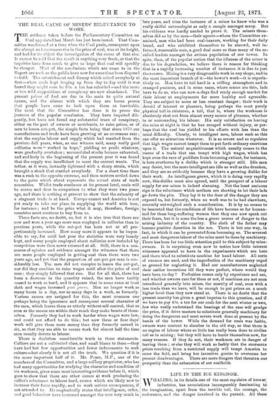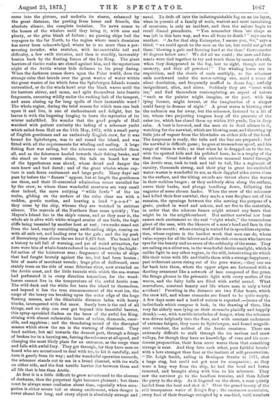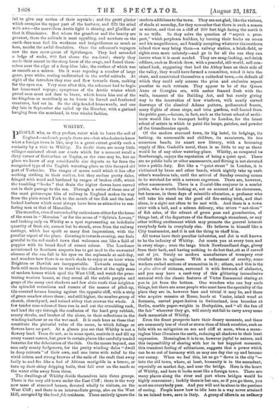LIFE IN THE ICE KINGDOM.
WHALING, in its details one of the most repulsive of hum ak industries, has associations incomparably fascinating tci- the imagination, apart from the terrible toil, the courage, the endurance, and the danger involved in the pursuit. All these come into the picture, and underlie its charm, enhanced by the great distance, the parting from home and friends, the absolute silence, the complete isolation. No news comes to the homes of the whalers until they bring it, with ease and plenty, or the grim blank of failure ; no passing ships hail the voyagers to the far North, to the region where man's dominion has never been acknowledged, where he is no more than a per- severing invader, who snatches, with inconceivable toil and difficulty, a few swift victories, and then is steadily, inexorably beaten back by the floating forces of the Ice King. The giant barriers of the ice realm are closed against him, and the mysterious night of the Arctic winter bids defiance to his puny daring. When the darkness comes down upon the Polar world, does the strange calm that broods over the great wastes of water within the great wastes of ice which form the Spitzbergen Islands remain untroubled, or do the winds howl over the black waves until the ice barriers shiver, and moan, and split themselves into frantic fragments, careering wildly under the rushing lash of the tempest, and anon closing up for long spells of their inexorable ward ? The whole region, during the brief season for which man can look upon it and live, is one of enchantment and delight, but he leaves it with the lingering longing to learn the mysteries of its winter unfulfilled. No wonder that the good people of Hull watched with patient curiosity the lading of a schooner yacht which sailed from Hull on the 11th May, 1872, with a small party of English gentlemen and an exclusively English crew, for it was bound for Spitzbergen, was to sail round the island, and was fitted with all the requirements for whaling and sealing. A large fishing fleet was sailing, but the schooner soon outsailed them all, and as the fishermen hauled towards their fishing banks, and she stood on her course alone, the talk on board her was of the hyperborean seas ahead, whose dread and danger the men knew and had dared ; and of the great whales whose cap- ture is such fierce excitement and large profit. Many days' sail pass by before the " finners " appear, but at length the gentlemen -see them, and their ill-concealed admiration seems uncalled for by the crew, to whom these wonderful creatures are very small deer indeed, the mere outlying " wilde fowle " of the ice realm, gliding on the surface of the calm clear sea with a sudden, gentle motion, and heaving a loud " p-o-o-f " as they come by the ship, whence they are watched in strictest -silence. The marvels of the Northern Seas come quickly ; Van Mayen's Island lies in the ship's course, and as they near it, the whole air is alive with white-winged armies of sea birds, the high cliffs being tenanted by another host at rest ; two rocks stand out from the land, exactly resembling swift-sailing ships, coming on with all sails set, and heeling over to the gale ; and the icy peak -of Beerenberg rises above the sea level 6,870 feet. The beach had a history to tell full of warning, and yet of weird attraction, for here were bits of whale-boats reduced to matchwood by the fright- ful action of the boisterous seas ; fragments of wrecks of ships that had fought bravely against the ice, but had been beaten ; bits of masts of merchant vessels ; huge piles of driftwood, once stately trees on the side of some Siberian river, now stranded on 'the Arctic coast, and the little tunnels with which the sea-worms bad perforated it in every direction tenantless, for the wood- borers cannot live in the temperature of the awful Arctic seas. The wild duck and the white fox have the island to themselves, and beyond it lies the true commencement of the west ice, the surge of the heavy sea breaking upon the outer edge of the huge floating masses, and the illimitable distance laden with heavy blocks, interspersed with flat snow. Surely here is the end of all things, and no ship can ever get beyond this beautiful barrier, this spray-sprinkled diadem on the brow of the awful Ice King, -shining with almost unbearable lustre of rubies, diamonds, emer- alds, and sapphires ; and the thundering sound of the disrupted masses which strew the sea is the warning of dismissal. They heed neither, but sail towards the densest part, through a fringe of broken ice in a heaving sea, forcing the schooner at all speed, and charging the most likely place for an entrance, as the surge rises and falls with awful fury. They get through, for they have men on board who are accustomed to deal with ice, to hit it carefully, and turn it gently from its way; and the wonderful operation succeeds, the schooner stands out to sea in a broad channel, with ice walls -on either side, and the first terrific barrier lies between them and all life that is less than Arctic.
At first it is a little difficult to grow accustomed to the absence of darkness, then the perpetual light becomes pleasant; but there must be always some confusion about time, especially when occu- pation is either severe toil or strong excitement, when danger is never absent for long, and every object is absolutely strange and
novel. To drift off into the indistinguishable fog on an ice layer, when in pursuit of a family of seals, wariest and most tantalising of creatures, is only an incident, and then the sailors begin to recall dismal precedents. " You remember them 'ere chaps as was left in this here way, and was all froze to death ? " says one to another. "As for that ship Enterprise, I assure you, Sir," says a third, " we could speak to the men on the ice, but could not get at them ! blowing a gale and freezing hard at the time ! thermometer 40 degrees below zero ! We did all we could ; the oars and fore- masts were tied together to try and reach them by means of a raft, when they disappeared in the fog, lost to sight, though not to memory, and they all perished ! " The whaling boats are in requisition, and the shoals of seals multiply, as the schooner sails northward under the never-setting sun, amid a scene of silent desolation, and frequently muffled in dense fog ; awfully insignificant, alien, and alone. Suddenly they are "beset with ice," and find themselves contemplating an aspect of nature " such as the painter might imagine, or the poet, with hip lying licence, might invent, or the imagination of a sleeper could fancy in dreams of night." A great storm is blowing over the unfrozen sea far away, but the schooner, fastened to a bit of ice, whose two projecting tongues keep off the pressure of the outer ice, which has closed them up within 200 yards, lies in deep calm. A boat is lowered, and the men sit in dead silence in it, watching for the narwhal, which are blowing near, and throwing up little jets of vapour from the blowholes on either eide of the head. The harpooner is ready, the tubs and the line are prepared ; but the narwhal is difficult game ; he goes at tremendous speed, and his range of vision is wide ; so that when he is dragged on to the ice, with his spotted hide and his polished horn, he is a trophy of the first class. Great hordes of this curious mammal travel through the Arctic seas, tusk to tusk and tail to tail, like a regiment of cavalry, thousands strong, and their play in great ice-encircled water-wastes is wonderful to see, as their dappled sides curve close to the surface, and the tilting swords are thrust above the waves in their reckless lunges ; or they suddenly skim along the surface, curve their backs, and plunge headlong down, following the vagaries of some chosen leader. When the crew of the schooner had killed their first narwhal, they made a vast fireplace out of his remains, the openings between the ribs serving the purpose of a grate, packed in wood and oakum, and set fire to the materials, in order that the odorous fumes might attract any bears that might be in the neighbourhood. But neither narwhal nor bear causes such excitement as the real "right whale," the tremendous giant of the seas, with the likeness of a man's bead and face in the roof of his mouth ; whose coming is waited for in speechless expecta- tion, whose capture is the hardest work that men can do, whose value repays for all the labour and all the risk even men who have no eyes for the beauty and uo sense of the sublimity of the scene. They are sailing on a silver sea, in the wonderful Arctic sunlight, which is unlike light in any other region, in the still, intoxicating air which fills their veins with life and thrills them with a strange happiness ; past iridescent caves rising out of the pure water,—they can see far back into them, where the upper edges are festooned with a dazzling ornament like a network of lace composed of fine gems, the fringe gleams in the prismatic light with every motion of the waves, and the fairy halls are filled with awful sound. What marvellous, constant beauty and life where man is only a brief accident l Prowling in the distance are two Polar bears, which the crew kill, and whose stomachs are found to be quite empty. A few days more and a herd of walrus is reported ;—(some of the individuals which compose it look, in the drawing of them, like very fat elderly men lying on their stomachs placidly and happily drunk) :—so, with terrible interludes of danger, when the schooner was driven helplessly into the floes, and with constant endurance of extreme fatigue, they came to Spitzbergen, and found magnifi- cent reindeer, the noblest of the Arctic creatures. These are extremely difficult to stalk through the ice ravines and snow valleys, for though they have no knowledge of roan and his mur- derous propensities, their keen scent warns them that something strange is near. And they love each other, poor faithful beasts! with a love stronger than fear or the instinct of self-preservation. "Mr. Leigh Smith, sailing in Benlopen Straits in 1871, shot a large stag, but could not get near its companion ; as they were a long way from the ship, be had the bead and horns removed, and brought along with him to his schooner. They saw the survivor go to the headless remains, and then follow the party to the ship. As it lingered on the shore, a man quietly landed from the boat and shot it." Over the grand beauty of the still transparent water of King's Bay ; the enormous mountains, every foot of their frontage occupied by a sea-bird, until numbers
fail to give any notion of their myriads ; and the great glacier which occupies the upper part of the harbour, and fills thn Wind with awe—the marvellous Arctic light is shining, and glorifies all that it illuminates. But where the grandeur and the beauty are greatest, there the solitude is most appalling, and nowhere ou the earth does man feel his weakness and insignificance so much as here, amidst the awful desolation. Once the schooner's voyagers saw the rare snow-goose of Spitzbergen. They had ascended a ledge of rocks, 800 feet above the sea-level ; slowly they made their ascent to the steep brow of the crags, and found them- selves near the edge of a deep blue lake, the surface of which was as smooth as a mirror. On it were reposing a number of large geese, pure white, resting undisturbed in the awful solitude. At sight of the intruders they rose and flew towards them, making for the open sea. Very soon after this, the schooner had to begin her homeward voyage ; symptoms of the Arctic winter which proud man must not dare to brave, which hunts him out of the ice kingdom as mercilessly as be hunts its furred and feathered creatures, had set in. So the ship headed homewards, and one day late in September she sailed up the Humber, with a garland hanging from the masthead, in true whaler fashion.
































 Previous page
Previous page